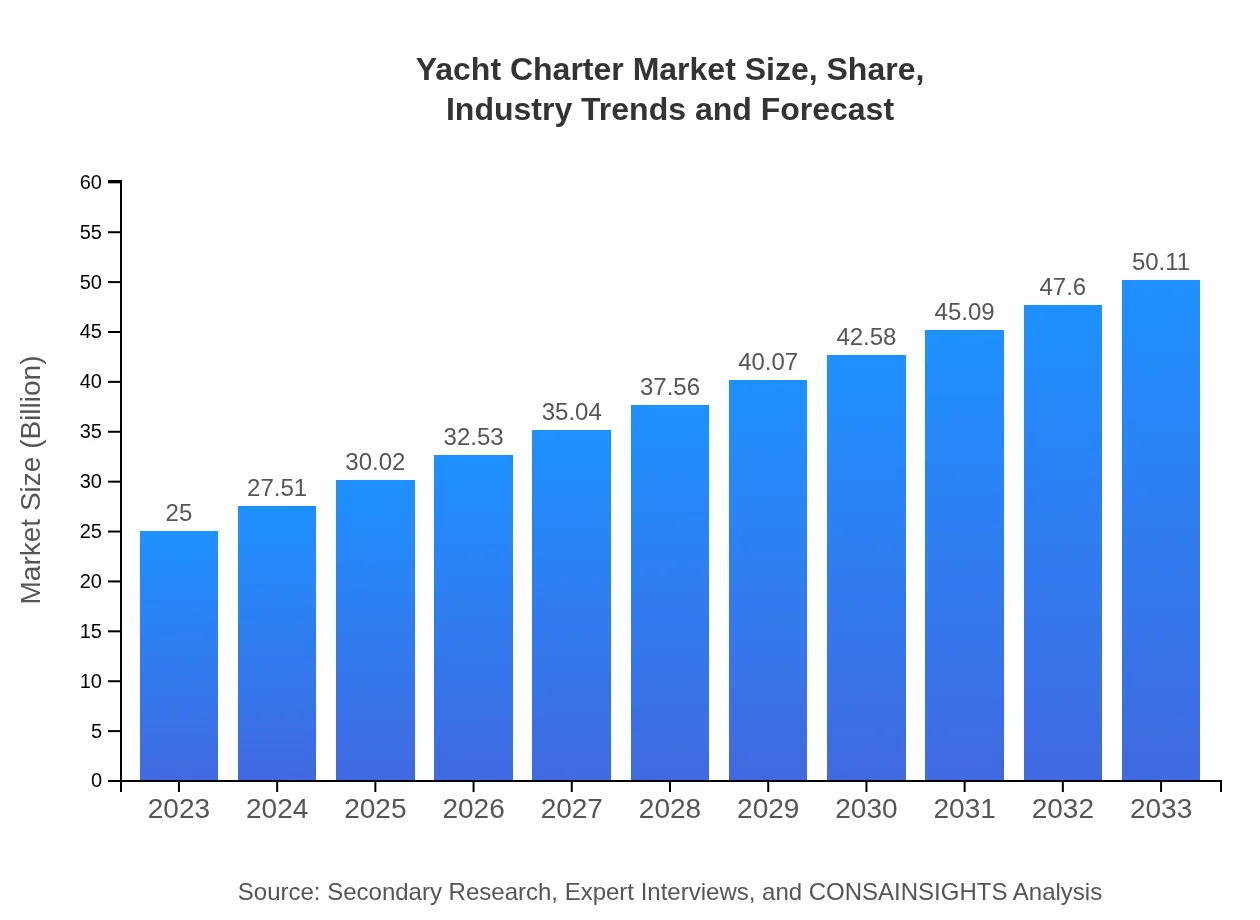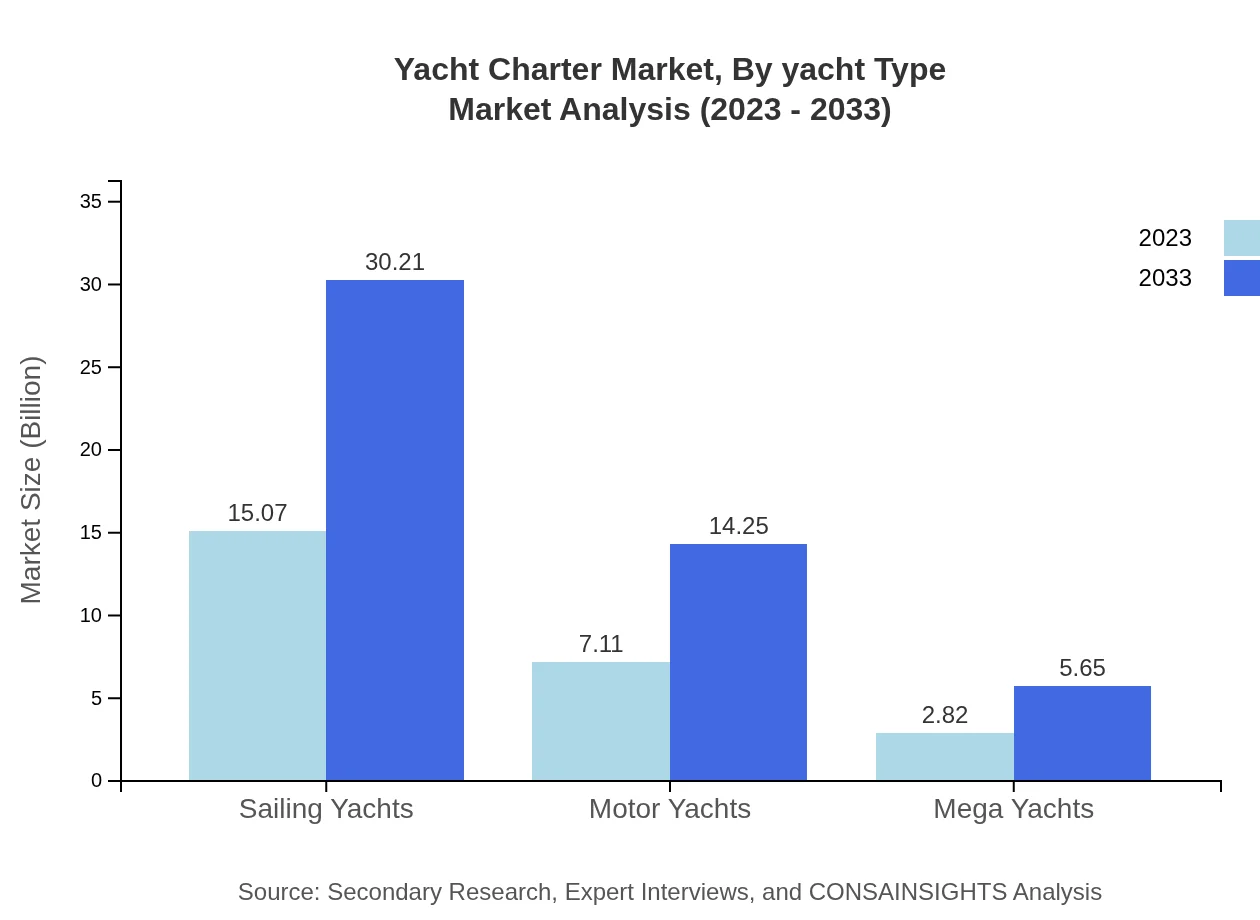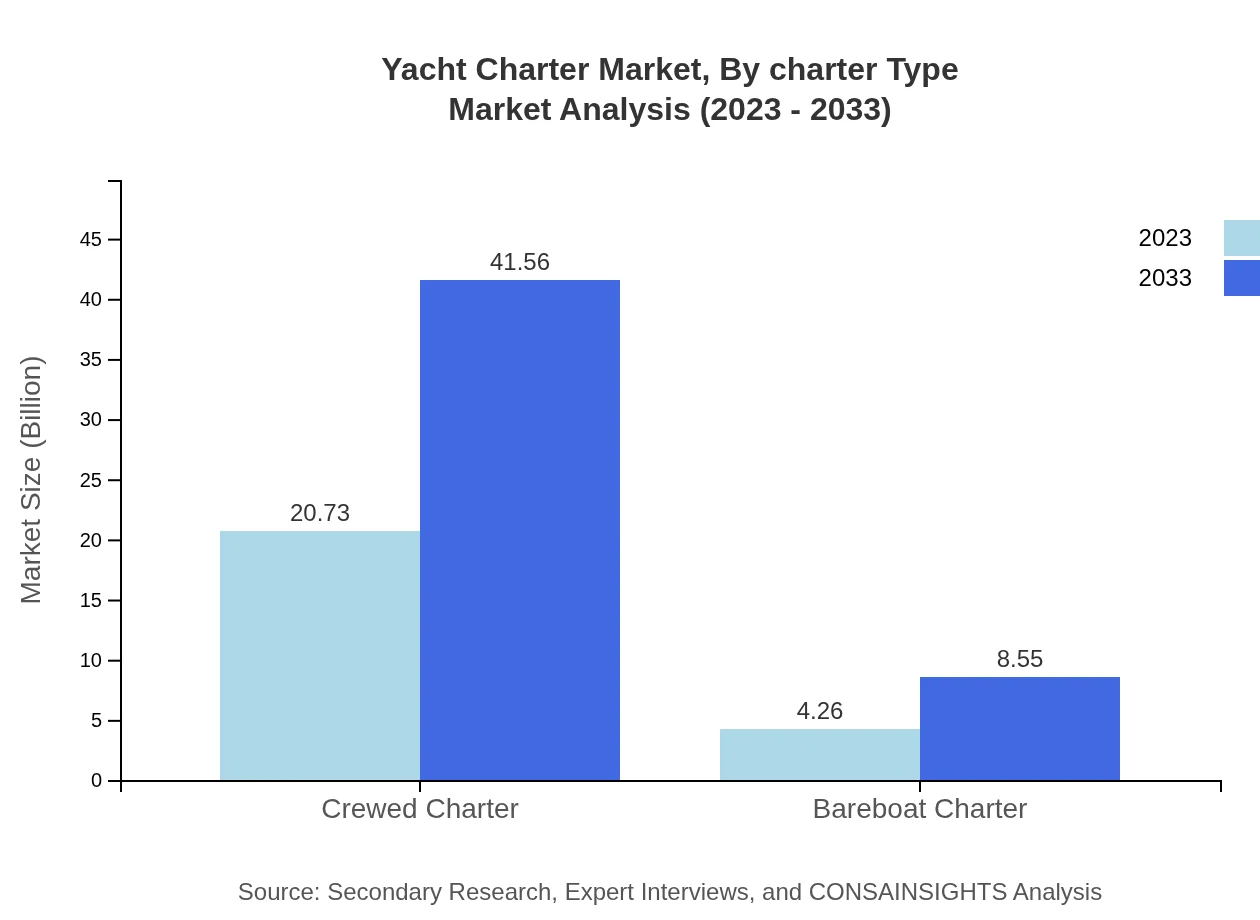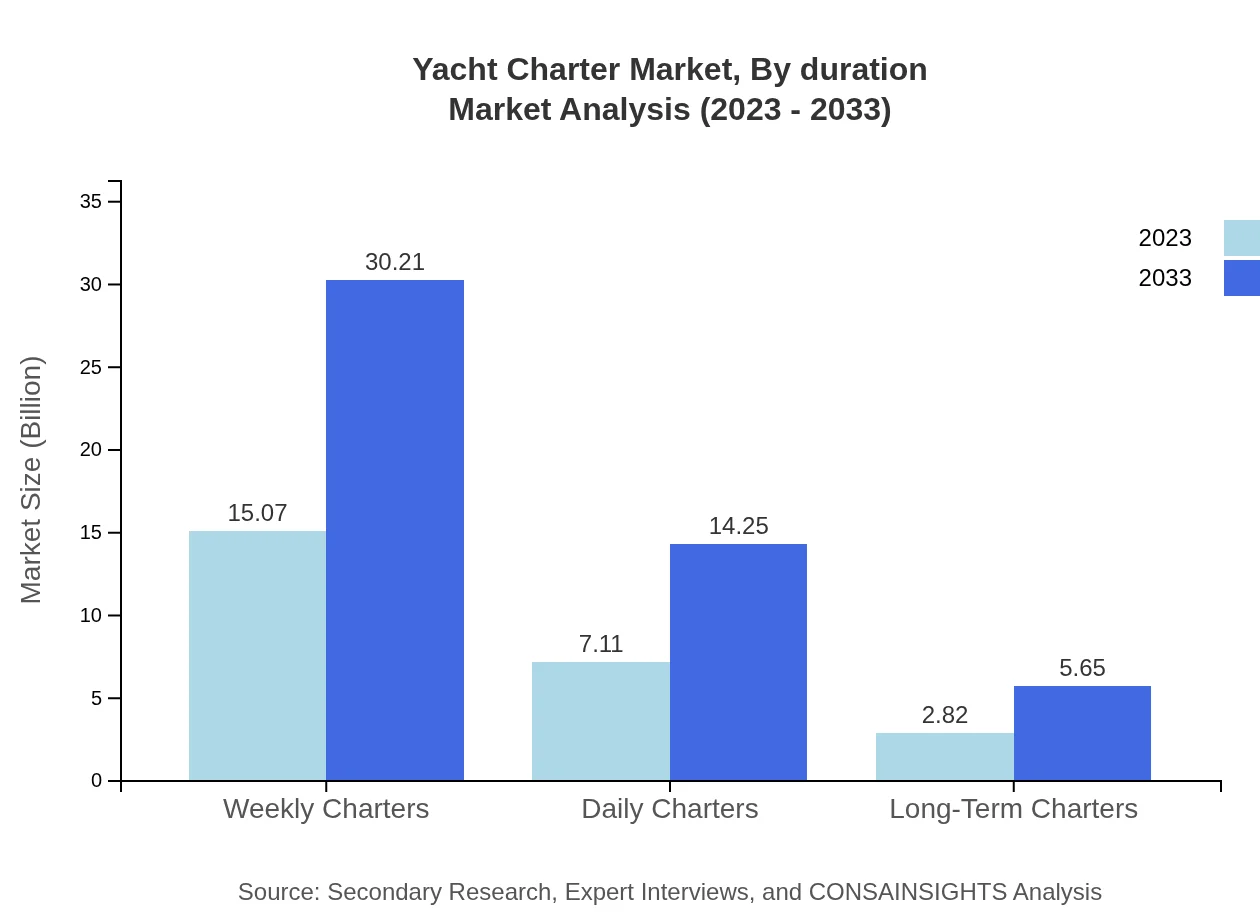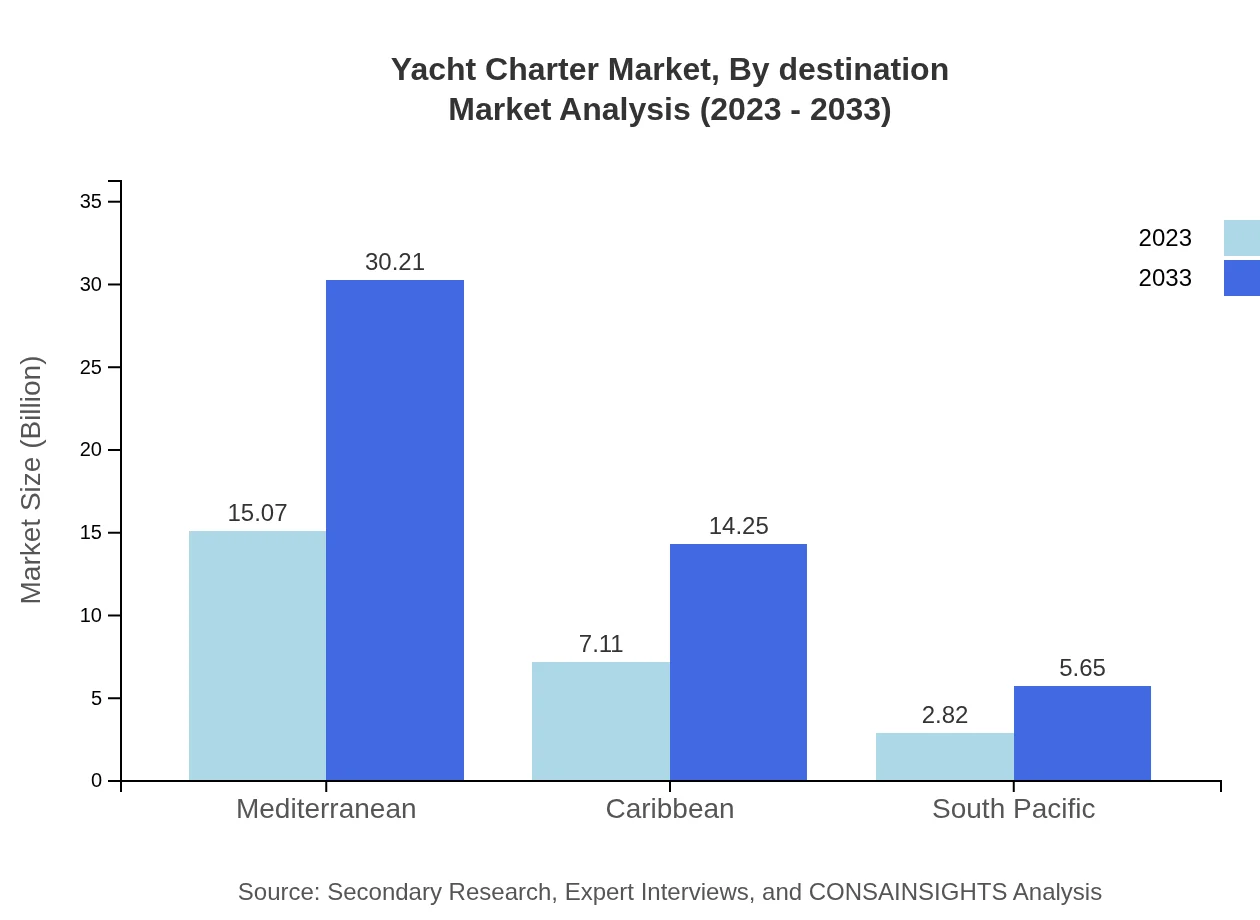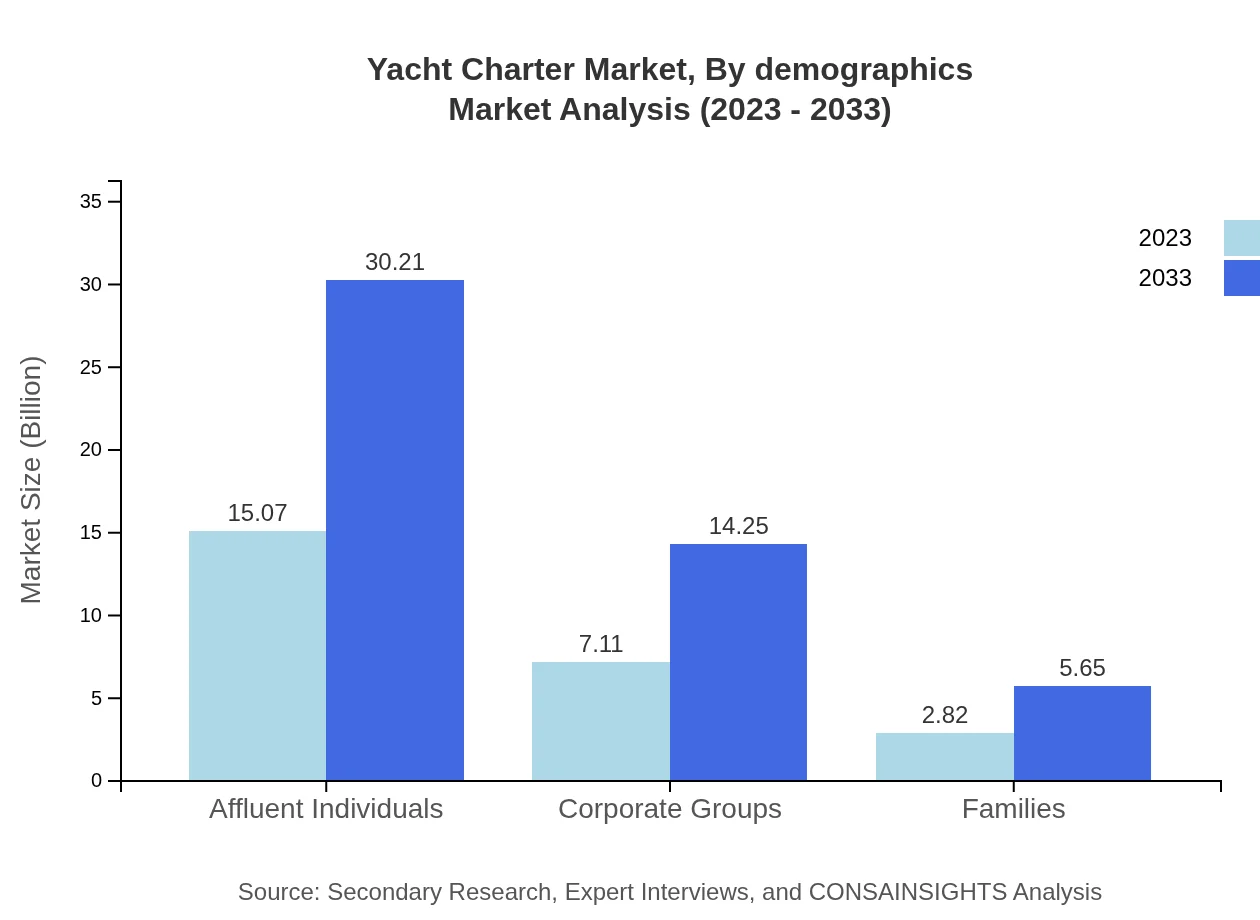Yacht Charter Market Report
Published Date: 02 February 2026 | Report Code: yacht-charter
Yacht Charter Market Size, Share, Industry Trends and Forecast to 2033
This report provides a comprehensive analysis of the Yacht Charter market, offering insights into its size, growth trends, segment performance, regional dynamics, and forecasts spanning from 2023 to 2033.
| Metric | Value |
|---|---|
| Study Period | 2023 - 2033 |
| 2023 Market Size | $25.00 Billion |
| CAGR (2023-2033) | 7% |
| 2033 Market Size | $50.11 Billion |
| Top Companies | Sunseeker, Burgess Yachts, Fraser Yachts, CharterWorld |
| Last Modified Date | 02 February 2026 |
Yacht Charter Market Overview
Customize Yacht Charter Market Report market research report
- ✔ Get in-depth analysis of Yacht Charter market size, growth, and forecasts.
- ✔ Understand Yacht Charter's regional dynamics and industry-specific trends.
- ✔ Identify potential applications, end-user demand, and growth segments in Yacht Charter
What is the Market Size & CAGR of Yacht Charter market in 2023?
Yacht Charter Industry Analysis
Yacht Charter Market Segmentation and Scope
Tell us your focus area and get a customized research report.
Yacht Charter Market Analysis Report by Region
Europe Yacht Charter Market Report:
Europe remains the leading player in the yacht charter market, with a valuation of USD 9.19 billion in 2023, expected to double to USD 18.43 billion by 2033. Its traditional charm as a yachting destination and highly developed tourism infrastructure are key growth drivers.Asia Pacific Yacht Charter Market Report:
The Asia Pacific region, with a market size of USD 3.99 billion in 2023, is set to grow to USD 7.99 billion by 2033. The rising middle class and increasing tourist footfall, alongside a growing affinity for water-based activities, bolster the region's yacht charter market.North America Yacht Charter Market Report:
North America shows significant activity in the yacht charter industry, with an estimated market size of USD 8.18 billion in 2023, anticipated to grow to USD 16.39 billion by 2033. This growth is attributed to high disposable incomes and a strong preference for luxury travel experiences.South America Yacht Charter Market Report:
South America presents a growing yacht charter environment, demonstrating a market size of USD 1.35 billion in 2023, projected to reach USD 2.71 billion by 2033. The appeal of its coastal regions and increasing tourism potential enhances its market presence.Middle East & Africa Yacht Charter Market Report:
The Middle East and Africa region forecasts a market increase from USD 2.29 billion in 2023 to USD 4.60 billion by 2033. The region's growing luxury tourism segment, paired with various coastal developments, sets a robust foundation for market expansion.Tell us your focus area and get a customized research report.
Yacht Charter Market Analysis By Yacht Type
The yacht type segmentation comprises sailing yachts, motor yachts, and mega yachts. Sailing yachts are prevalent, holding a market size of USD 15.07 billion in 2023 and projected to increase to USD 30.21 billion by 2033. Motor yachts represent a significant share, with a size of USD 7.11 billion in 2023, expected to reach USD 14.25 billion by 2033. Mega yachts cater to ultra-high-net-worth individuals, showing growth potential with their size transitioning from USD 2.82 to USD 5.65 billion during the same forecast period.
Yacht Charter Market Analysis By Charter Type
Charter types are crucial in determining offerings that appeal to customers. Crewed charters dominate, valued at USD 20.73 billion in 2023 with a trajectory to USD 41.56 billion by 2033. Conversely, bareboat charters, while smaller, showcase growth potential, increasing from USD 4.26 billion to USD 8.55 billion in the same timeframe.
Yacht Charter Market Analysis By Duration
The duration segment details different chartering preferences: weekly, daily, and long-term. Weekly charters are segment leaders with sizes of USD 15.07 billion in 2023 and expected to reach USD 30.21 billion over the forecast period. Daily charters account for USD 7.11 billion, projected to grow to USD 14.25 billion, while long-term charters, though smaller, present steady growth from USD 2.82 billion to USD 5.65 billion.
Yacht Charter Market Analysis By Destination
Destination preferences highlight the Mediterranean as a prime market with a richness of options, reaching USD 15.07 billion and expected to double by 2033. The Caribbean follows with a market of USD 7.11 billion in 2023, showing promising growth. The South Pacific, while smaller at USD 2.82 billion, reflects substantial interest in its unique offerings.
Yacht Charter Market Analysis By Demographics
Demographic segmentation showcases diverse interests among affluent individuals, corporate groups, and families. The affluent bracket leads with USD 15.07 billion in market size and anticipated growth. Corporate groups present a modest share with USD 7.11 billion, destined to rise as business travel evolves into experiential travel. Families, while the smallest segment, reflect consistent growth with USD 2.82 billion.
Yacht Charter Market Trends and Future Forecast
Tell us your focus area and get a customized research report.
Global Market Leaders and Top Companies in Yacht Charter Industry
Sunseeker:
Sunseeker is a renowned yacht manufacturer and charter service provider, known for luxurious vessels that cater to high-net-worth clientele in stunning destinations worldwide.Burgess Yachts:
Burgess Yachts specializes in yacht sales and charters, providing bespoke services and a portfolio of superyachts that appeals to the elite yacht enthusiasts.Fraser Yachts:
With a global reach, Fraser Yachts offers an extensive fleet of luxury yachts for charter, focusing on unparalleled service and unique experiences across the globe.CharterWorld:
CharterWorld connects yacht owners with charter clients, offering personalized services and a diverse fleet to meet varying customer needs and preferences.We're grateful to work with incredible clients.









FAQs
What is the market size of yacht Charter?
The yacht charter market is valued at approximately $25 billion in 2023, with a projected CAGR of 7%, indicating sustained growth driven by increasing consumer demand and expanding travel preferences.
What are the key market players or companies in this yacht Charter industry?
Key players in the yacht charter market include companies like Sunseeker, MarineMax, and Dream Yacht Charter. These firms dominate through innovative fleets and exceptional services, catering to a diverse clientele seeking unique nautical experiences.
What are the primary factors driving the growth in the yacht Charter industry?
Growth in the yacht charter industry is propelled by rising disposable income, increased tourism, and the popularity of experiential travel. Consumers are also seeking personalized and luxurious travel options, boosting demand for yacht charters significantly.
Which region is the fastest Growing in the yacht Charter?
The fastest-growing region in the yacht charter market is North America, expected to grow from $8.18 billion in 2023 to $16.39 billion by 2033, driven by affluent consumer demographics and vibrant marine tourism.
Does ConsaInsights provide customized market report data for the yacht Charter industry?
Yes, ConsaInsights provides customized market report data for the yacht-charter industry, offering tailored analyses based on specific client needs, including segmented market insights and regionally focused data.
What deliverables can I expect from this yacht Charter market research project?
From the yacht-charter market research project, expect deliverables including comprehensive market analysis reports, trend assessments, competitive landscape evaluations, and detailed segment breakdowns highlighting key insights and growth opportunities.
What are the market trends of yacht Charter?
Current trends in the yacht charter market include the rising preference for crewed charters, expansion in luxury offerings, and increased interest in eco-tourism options, indicating a shift towards sustainability and unique experiences.

